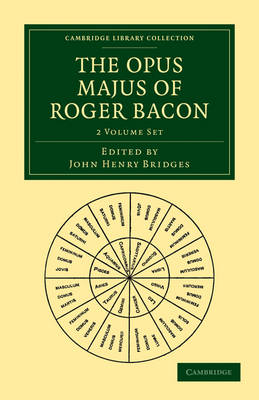Cambridge Library Collection - Physical Sciences
1 primary work • 4 total works
Volume 2
Bacon's "Opus Majus" is one of the most influential scientific and philosophical texts of its ages, and the high point of medieval knowledge of the physical sciences. Roger Bacon (c.1214-92) was the forerunner of modern scienfitic method, stressing the importance of systematic observation and experiment in the study of natural phenomena. He was ahead of his time in advocating the use of chemistry in medicine and the sue of mathematics in explaining astronomy and physics. Many of his experiments, particularly in optics, were ground-breaking, and his inventions were numerous - he is credited with devising the magnifying glass, a vacuum-globe balloon, eye glasses and the telescope. He believed the Earth to be round and that one could sial aroun it, he was the first Westerner to describe in detail the process of making gunpowder, and he even foresaw the inventioin of aircraft, motorized ships and cars. In the "Opus Majus" Bacon makes a plea for the reform of education, emphasizing the rightful role of the sciences in the university curriculum and the interdependence of the various disciplines.
Prepared in 1267 at the request of Pope Clement IV, the treatise is a collection of ideas, an encyclopedia of knowledge embracing all science including language, logic, optics, mathematics, moral philosophy and physics. This is a facsimile of the 1928 edition, the only complete English translation.
Prepared in 1267 at the request of Pope Clement IV, the treatise is a collection of ideas, an encyclopedia of knowledge embracing all science including language, logic, optics, mathematics, moral philosophy and physics. This is a facsimile of the 1928 edition, the only complete English translation.
Roger Bacon, the medieval natural philosopher who broke new ground in promoting scientific method, produced the encyclopedic Opus Majus or 'Greater Work' in the mid-thirteenth century. This 1897 publication in two volumes was the first complete edition of the work to appear in print. Written at the request of Pope Clement IV, the Opus Majus is the most significant and most influential of Bacon's works, containing his observations of the natural world and theories on knowledge acquisition. Bacon's text appears in the original Latin, and Bridges includes a substantial introduction and brief analysis of each chapter in English, as well as extensive footnotes and an analytical table to aid the reader. The book covers theology, language and mathematics, optics, experimental science, and moral philosophy. This reissue also incorporates a later supplement containing additional material and corrections.
Roger Bacon, the medieval natural philosopher who broke new ground in promoting scientific method, produced the encyclopedic Opus Majus or 'Greater Work' in the mid-thirteenth century. This 1897 publication in two volumes was the first complete edition of the work to appear in print. Written at the request of Pope Clement IV, the Opus Majus is the most significant and most influential of Bacon's works, containing his observations of the natural world and theories on knowledge acquisition. Bacon's text appears in the original Latin, and Bridges includes a substantial introduction and brief analysis of each chapter in English, as well as extensive footnotes and an analytical table to aid the reader. Volume 1 contains the first four parts of Bacon's treatise with sections on 'Wisdom and Truth', 'The connection of Philosophy with Theology', 'The Study of Language', and 'Mathematical Science'.
Roger Bacon, the medieval natural philosopher who broke new ground in promoting scientific method, produced the encyclopedic Opus Majus or 'Greater Work' in the mid-thirteenth century. This 1897 publication in two volumes was the first complete edition of the work to appear in print. Written at the request of Pope Clement IV, the Opus Majus is the most significant and most influential of Bacon's works, containing his observations of the natural world and theories on knowledge acquisition. Bacon's text appears in the original Latin, and Bridges includes a substantial introduction and brief analysis of each chapter in English, as well as extensive footnotes and an analytical table to aid the reader. Volume 2 contains the last three parts of Bacon's treatise, on Optics, Experimental Science, and Moral Philosophy. This volume also incorporates a later supplement containing additional material and corrections.


